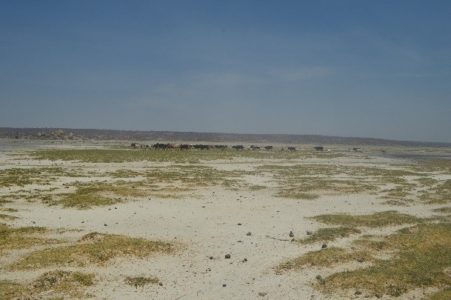
Orange-Fleshed Sweetpotato (OFSP) multiplication fields at Ilindi village are impressive and inspirational. The fields, managed by very committed OFSP growers, use irrigation from the nearby Lake Manyara. The proximity of the land to the lake makes the water table very high allowing the farmers to dig up wells to irrigate their crops.
Ilindi village is administratively located in a semi-arid area in the Bahi District of Dodoma – Tanzania. From the main road, one does not expect to see anything green and productive growing here; until you come across these evergreen and beautiful OFSP vine multiplication fields.
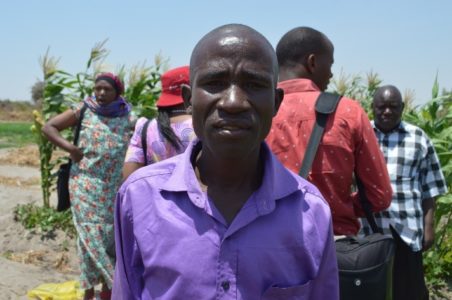
Julius Kayongola (pictured left), a farmer from Ilindi village – shared his journey to becoming a seasoned OFSP vine multiplier and root grower. In December 2015, he was one of the beneficiaries of the OFSP seed production and multiplication training course organized by Sugar Research Institute (SRI-Kibaha) Tanzania, with funding from the Food and Agriculture Organization (FAO).
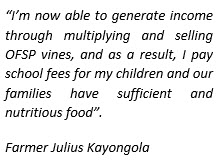 Julius explained that after the training, he received a sample of four cuttings of multiplier vines that he has since multiplied to cover a 0.5-acre piece of land with the aid of irrigation. He also shared the vines with his family members and neighbors and as a result, many members of Ilindi community now produce and consume OFSP throughout the year.
Julius explained that after the training, he received a sample of four cuttings of multiplier vines that he has since multiplied to cover a 0.5-acre piece of land with the aid of irrigation. He also shared the vines with his family members and neighbors and as a result, many members of Ilindi community now produce and consume OFSP throughout the year.
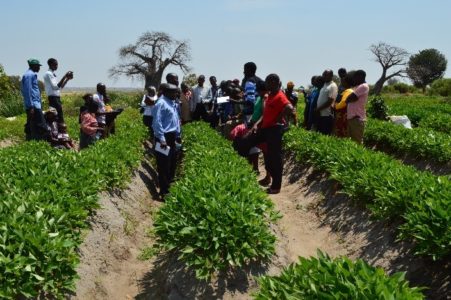
The OFSP farmers multiply various varieties OFSP vines and sell them at the local market and generate income as a result.
The ‘Ejumula’ variety of OFSP is one of the most popular with the Ilindi farmers. It grows impressively in semi-arid conditions and produces gigantic roots (see Figure 4). These roots make the perfect nutritious staple food that is widely consumed at Ilindi.
Julius’s story is a good example of the impact and sustainability of the Reaching Agents of Change (RAC) project’s capacity development efforts. Between 2011 and 2014, the International Potato Centre (CIP) and Helen Keller International implemented RAC; an initiative that advocated for increased investment in Orange-fleshed sweetpotato (OFSP) to combat vitamin A deficiency among young children and women of reproductive age. RAC developed capacity of national partners like Sugar Research Institute (SRI-Kibaha) in Tanzania and other key beneficiaries to enable them self-organize, drive their own agenda, take ownership, and pass down the skills acquired to the end-user – the farmer.
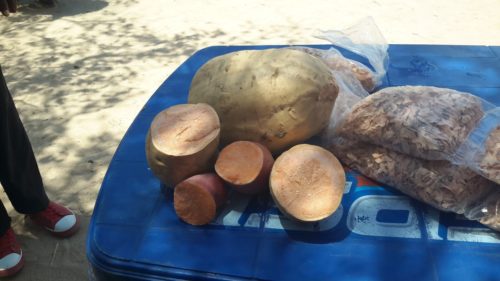
In this case, SRI-Kibaha received a grant of US$20,000 from the Food and Agriculture Organization (FAO) in 2015. This was one of the outcomes of RAC’s advocacy efforts that raised more than more US $21.6 million in the target countries (Nigeria, Tanzania, Mozambique, Ghana and Burkina Faso) for OFSP initiatives and food-based approaches. SRI-Kibaha and Hombolo Agriculture Research Institute (ARI – Hombolo) are some of the institutions whose capacity was strengthened by RAC to deliver Training of Trainer (ToT) courses on “Everything you ever wanted to know about sweetpotato.” They are now cascading this knowledge and expertise to extension workers, farmers and other stakeholders along the sweetpotato value chain to ensure for impact at scale.
SRI-Kibaha and ARI-Hombolo were able to use Julius story to capacitate and inspire other OFSP farmers through a field visit which was part of a 2-day training on agronomy and seed production conducted on 26-27 September 2016. The training targeted agriculture extension workers and vine multipliers from 6 districts in Singida and 6 districts in Dodoma districts. The objective of the training was to equip the participants with knowledge, skills, and technical understanding of OFSP seed production.
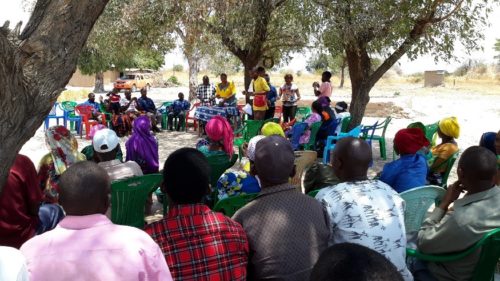
Ilindi’s 4 year OFSP Initiative is launched
Consequently, Ilindi village recently launched a 4-year OFSP growing initiative that will ensure that all the twenty-two thousand households grow and consume OFSP by 2020. This initiative aims to increase food and nutrition security for the Ilindi community and generate wealth for families.
This project is spearheaded by Mr. Anthony Sahali, the Ward agriculture extension officer with support from other OFSP champions among them Ms. Tina Suday Mbassa – the Ward councilor.
The success realized as well as the achievements and lessons learnt from the RAC project led to the development of a follow-up project known as Building Nutritious Food Baskets (BNFB). The BNFB explores a scaling-up model through a multi-crop (food basket) approach to addressing hidden hunger by catalyzing sustainable investments for the production and utilization of biofortified crops that are ready for scaling up, viz.: OFSP; vitamin A (yellow) cassava, vitamin A (orange) maize and high iron/zinc beans.
RAC and BNFB projects are funded and supported by the Bill & Melinda Gates Foundation
Learn more about Building Nutritious Food Baskets (BNFB)
